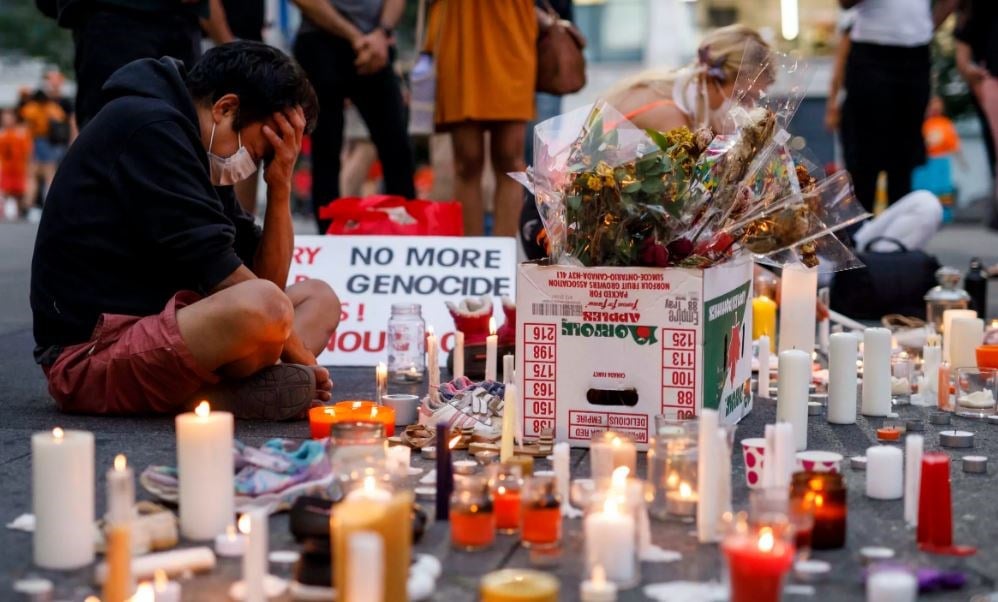Unveiling the silent genocide behind Canada's progressive façade
A deeply ingrained culture of severe violence targeting Indigenous women and girls has taken root within Canadian society.
-

A man holds his head as he attends an impromptu vigil at an anti-Canada Day event titled "No Pride in Genocide" in Toronto in July 2021. (AFP)
For more than a decade, Canada has skillfully projected an image of liberalism, progressiveness, and inclusivity, which sets it apart from its more assertive neighboring country.
While former US President Donald Trump erected barriers, Justin Trudeau opened Canada's doors to refugees worldwide. As the US grappled with gun violence, Canada fortified its firearm regulations. And in contrast to the US' hesitance toward renewable energy, Canada embraced environmentally conscious initiatives.
However, behind this façade, a darker aspect of Canada's identity comes to light. Unseen by many, a troubling culture of extreme violence against Indigenous women and girls has become deeply rooted in Canadian society, leading the government to label it as genocide. Despite this revelation, the world largely remains unaware of the profound brutality Indigenous women endure in Canada.
This is the take of Sarah Green, an editor at The Telegraph, who corroborated the idea shown in startling statistics revealing the alarming discrepancy in safety faced by Indigenous women, as they are sixteen times more likely to be murdered or go missing compared to their Caucasian counterparts.
In her piece published by The Telegraph, Green acknowledged that Indigenous people also face a three-fold higher risk of experiencing sexual assault or rape. Furthermore, disturbing suicide rates are evident within this group, with 35 deaths per 100,000 Indigenous women, as opposed to 5 per 100,000 non-Indigenous women.
Even more shocking is the practice of forced sterilization, often associated with underprivileged nations, persisting within parts of Canada, often carried out by white medical practitioners, as per Green's piece.
Although precise figures elude measurement, Senator Yvonne Boyer approximates that around 12,000 Indigenous women have been subjected to involuntary sterilization since the 1970s.
Despite heightened awareness of the challenges Indigenous women face, experts assert that the full extent of their suffering remains largely unacknowledged, with numerous decades of crimes going unreported to the authorities.
Dr. Karine Duhamel, having engaged with over 3,000 Indigenous family members and violence survivors, spearheaded an inquiry into Missing and Murdered Indigenous Women and Girls, culminating in a 2019 report that revealed a significant number of cases absent from official police records.
Whispers of victims
Amid these narratives, stories akin to Morningstar Mercredi's emerge, shedding light on a horrific reality. Mercredi's experience unveils the painful truth of enduring involuntary sterilization, which she discovered only during a gynecologist's appointment. At just 14 years old and six months pregnant, a non-consensual procedure was performed on her, without her consent.
In Green's view, such disheartening stories are not isolated incidents or relics of the past. Forced sterilization continues to be an ongoing problem. These situations, deeply rooted in Canada's colonial history and the eugenics movement, expose underlying values that have marginalized Indigenous women and disregarded their rights.
A cycle of systemic indifference
Regrettably, instances of violence against Indigenous women rarely grab headlines, perpetuating a cycle of systemic indifference that fosters further victimization. Over the past 30 years, it's estimated that up to 4,000 Indigenous women and girls have either been killed or gone missing in Canada, a staggering figure that underscores an unaddressed epidemic of violence.
While some strides have been taken, including official recognition of the crisis and proposed legislation to criminalize forced sterilization, the road to justice remains lengthy, as per Green.
Indigenous women are increasingly finding their voices, sharing their stories, and leading conversations to confront Canada's silent genocide. Despite the formidable challenges, these efforts are pivotal in paving the way for healing and justice.

 4 Min Read
4 Min Read








